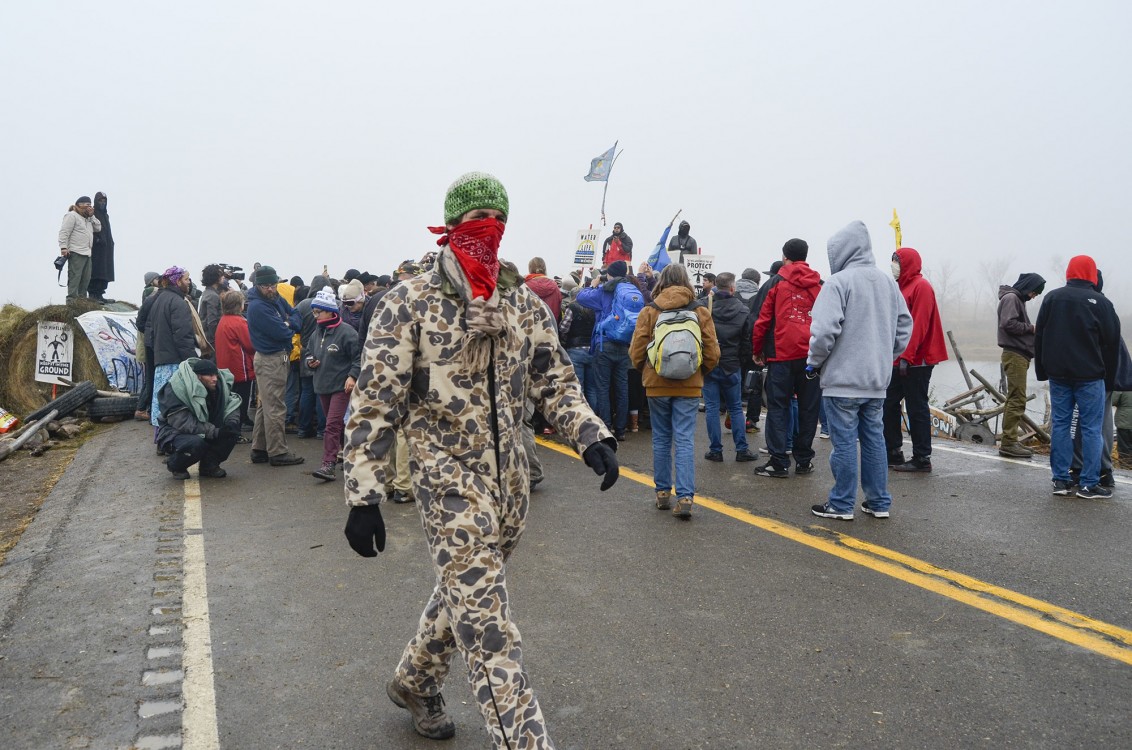
The most memorable domestic political scene of 2016 isn’t a bellowing demagogue real estate tycoon running for president, or people having scuffles at election rallies, or the Democratic nominee’s endless tangles of impropriety. 2016’s defining image is of attack dogs ripping the flesh of Native American protesters in North Dakota.
Two weeks ago, we celebrated the success of activists in the state of Washington forcing an Environmental Impact Statement on – and finally deterring – Shell’s proposed oil rail expansion in Anacortes in the northwest corner of the state. We were celebrating Standing Rock in a different way, more cautiously, as 2016 has been a year of convergence and strength for groups opposed to dirty oil transports and the dirty political system that demands it, and our movements felt strong.
But then, in North Dakota, the attack dogs were followed by hundreds of uniformed, armored bodies. Officially, some were cops and some soldiers, but on the ground the distinction no longer mattered. There have been waves of arrests, including a major offensive on Oct. 27-28 involving cops from five different states who were called to North Dakota on the pretext of disaster and riot response – a clear abuse of the formal agreement used to justify their presence.
Faulty legal arguments have characterized the police offensive all along. Besides the bogus pretext for inviting other states’ cops, prosecutors have massively overcharged reporters and filmmakers covering the demonstrations, asserting that sympathetic coverage of the event is the same as direct participation. Arrested protesters also report being strip-searched and kept overnight, sometimes naked, in cages resembling dog kennels.
The protesters had been nonviolently occupying a tiny fraction of the large swath of corporate landholding involved in the pipeline construction. They had been confrontational with their speech and performative acts, but had never so much as hinted at threats of violence. Sioux leaders assert much of the land actually belongs to them, by treaty. And irrespective of the legal status of that land, the construction of the pipeline runs through tribal ancestral lands with potential to harm their primary water supply.
Why Do Cops Protect Oil?
#nodapl goes beyond “where
should we put the pipeline?”
#waterislife is at odds with
the mere calculation of value.”
— J.W. Trull, writing from Oceti Sakowin Camp
If America in 2016 were represented by a giant oil painting, a mosaic illustration of power and resistance, we’d begin with the attack dogs, then pan out to the security guards and cops, then to a panoramic scene of guards, cops, soldiers and protesters foregrounding oil pipelines, oil trains, small and large wells, hydrological fracking platforms, refineries, fires, spills, and so on. The sky would be painted smoky and blood red.
Protests against oil always invite police retaliation, particularly when indigenous people lead the actions. In Ecuador, ongoing protests against oil and mining have been met by police beatings and shootings. Peruvian police have, in recent years, attacked indigenous villages fomenting protest against the oil industry in that nation. Canada’s brutal treatment of environmental activists, especially indigenous people, rebukes that country's carefully-tailored image of gentle bourgeois liberalism.
The contemporary list of murdered, framed, beaten and jailed anti-fossil fuel activists winds around the world. Few things appear more threatening to the economic order than the demand to accelerate oil’s demise, and the most robust democracies will suspend civil liberties and dress their cops in body armor when the people, particularly indigenous people, voice that demand.
In Morton County, North Dakota, that translated into cops shutting down a section of Highway 1806. They blocked off the highway after emptying the resistance camps of nonviolent protesters. One of the asymmetrical rules in play is that the cops can fly drones to monitor legal protester activity, but the protesters can’t fly drones to monitor cop activity. Asymmetrical economic systems require asymmetrical power relationships – hierarchies in which vastly different sets of rules govern. These systems place cops and soldiers into personified states of exception, even while dehumanizing, and ultimately abandoning, the bodies that occupy the uniforms and titles.
The North Dakota protesters’ willingness to traverse the “private property” of the extractors doesn’t just push back against the Dakota Access Pipeline project. The trespass questions the legitimacy of America's economic system itself. It synthesizes political action, philosophical critique, and the performance of an alternative worldview. It is a public argument against the extraction-and-exploitation economy. In turn, the deployment of soldiers, cops, private security and dogs in response to the trespass isn’t just the reaction of local jurisdictions. It’s the system arguing back.
That pounding down, that crushing of protests and alternative visions, has taken different forms over the centuries. In Southeast England in the 17th century, the radically egalitarian Diggers built a cooperative community on St. George’s Hill in Surrey. The nearby lord of the manor sent hired thugs to beat the residents and burn down their common house, after which the Diggers were hauled into court and ordered to disperse.
Within a hundred and fifty years, the manor lords’ system had become the industrial capitalists’ system. Machine-like exploitation and extraction made streamlined policing necessary and inevitable. In England and the United States, the police – uniformed, deputized, trained civil servants – were invented between 1825 and 1855, during a century that had begun with industrial capitalism confident in itself, and which would end with serious doubts about its future. The early part of the 19th century saw riots in the U.S. and strikes in England. Karl Marx revolutionized anti-capitalist thought in the middle of the century, and by the end of the century, strikes and union organizing were occurring across the U.S.
Private and state-run security forces functioned not only to crush dissent, but also to clean up the social messes arising from the financial system’s unmet needs, and its reproduction of extractive and exploitative behavior. The police emerged from the same soldier stock as those who guarded plantation slaves or fought indigenous people. Techniques, titles, and tactics carried over.
There’s a lot more history here, including many reasons why the militarization of policing has grown steadily in the ensuing decades. The primary rule has been that dissent against the material order can’t be tolerated. Any civil disobedience against the fossil fuel industry breaks that rule. Indigenous people converging in the thousands to challenge that rule is even more egregious, because it reminds the ruling class where and upon whom its material foundation rests.
So, like the Diggers in 1649, the Sioux and their allies in North Dakota have been beaten, their sacred grounds sabotaged, and their cause undermined by courts. That pattern – direct violence, structural sabotage, biased law – requires reliable cops.
But with research in recent years showing growing numbers of Americans – and a majority of millennials and youth – rejecting traditional capitalism and demanding a rapid, radical transition to zero-carbon energy systems, the crowds will only grow bigger and the protests louder. It’s that resistance that has sparked the increasingly brutal police responses we're seeing in North Dakota. Attack dogs, heavy armor, strip searches of protesters, tiny cages: these are the operating costs of the dying carbon economy, the brutal dance of an oligarchy opposed to solidarity and sustainability. They’re fighting harder now because we’re winning. They’ll fight harder still.
Matt Stannard is Policy Director at Commonomics USA.

3 WAYS TO SHOW YOUR SUPPORT
- Log in to post comments














